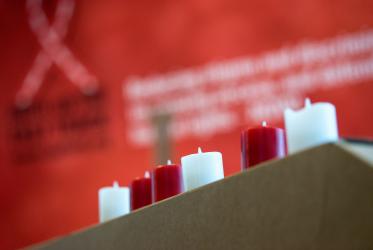The World Council of Churches-Ecumenical Advocacy Alliance (WCC-EAA) welcomes an agreement between the Medicines Patent Pool (MPP), the Government of South Africa and Abbvie, a research-based biopharmaceutical company, to work together to overcome supply challenges relating to second-line HIV and AIDS treatments lopinavir and ritonavir (LPV/r) in South Africa.
Africa accounted for 90% of the total usage of LPV/r among the donor-funded low and middle-income countries markets in 2013-2014. Presently, there are approximately 160,000 adults on LPV/r in South Africa. As supply problems emerged earlier this year, resulting in stock-outs in some parts of the country, 12% of facilities were experiencing ongoing stock-outs, which may have serious consequences for patients. The government of South Africa, MPP and AbbVie agreed to seek a solution that would enable South Africa to purchase from alternative suppliers of LPV/r.
In countries where LPV, RTV or LPV/r are patented, only AbbVie can supply this crucial medicine. Until now, the only voluntary licence on LPV and RTV was negotiated by the MPP with AbbVie in December 2014, and it only covered pediatric formulations needed by children under 3 years of age. There were no licences on adult formulations.
“We welcome this move by AbbVie to enter into an agreement covering adult medicines and see it as a turning point for the company’s approach to the HIV pandemic”, said David Deakin, executive director at Chasing Zero and chair of the WCC-EAA Access to Treatment Working Group (A2TWG).
This licence will allow generic ARV manufacturers to supply South Africa with generic versions of LPV/r, RTV and other combinations containing ritonavir in order to address supply challenges. The licence will also enable generic manufacturers based in countries where there are patents (e.g. China, South Africa) to manufacture generic versions to sell in any African country.
Patricia Zerega, a member of the WCC –EAA A2TWG said, “It’s the first adult agreement with the MPP that AbbVie has engaged in, and we hope that this opens the door to get other countries facing supply and pricing challenges to begin to address the need.”
Noting that there is still a long way to go to enable full second-line treatment access, Astrid Berner-Rodoreda, policy advisor on HIV and AIDS for Brot für die Welt and member of the WCC-EAA A2TWG said, “This license is a good start, and we welcome the initiative by Abbvie, the MPP and the government of South Africa. Many people in South Africa will benefit from this licence, however, it is vital that Abbvie include more middle-income countries since LPV/r is one of the most common second-line treatments.”
Background information
— The agreement is a non-exclusive royalty-free licence for LPV/r and RTV.
— The licence allows for manufacturing of the active pharmaceutical ingredients or finished formulations anywhere in the world.
— Sales can happen in all of Africa (including North Africa). However, the key focus of the agreement is South Africa where there are various patents on LPV and LPV/r.
— While other countries in Africa are already able to purchase generic versions from India, the licence will enable manufacturers in countries where there are patents (e.g. China, South Africa) to develop and sell generic versions of LPV/r, RTV and combinations of RTV with other ARVs, e.g. ATV/r and DRV/r. Note that an MPP licensee, Desano (China), is already developing ATV/r.
— The licence expressly provides for supply by sub-licensees outside the licensed countries where a compulsory licence is issued.
— Licensees can sell outside the territory where there is no infringement of granted patents.
— There will be no impediment to challenging the patents licensed.
— The agreement allows for the development of combinations with other ARVs. Important in particular could be combinations with atazanavir (ATV) and darunavir (DRV) as alternative second-line treatments for South Africa.
— The licence includes disclosure of patents on LPV/r within and outside the licensed territory.
The Ecumenical Advocacy Alliance, an ecumenical initiative of the World Council of Churches, is a global network of churches and related organizations committed to campaigning together on common concerns for justice and human dignity. Current campaign issues are HIV and AIDS, food security and sustainable agriculture.







